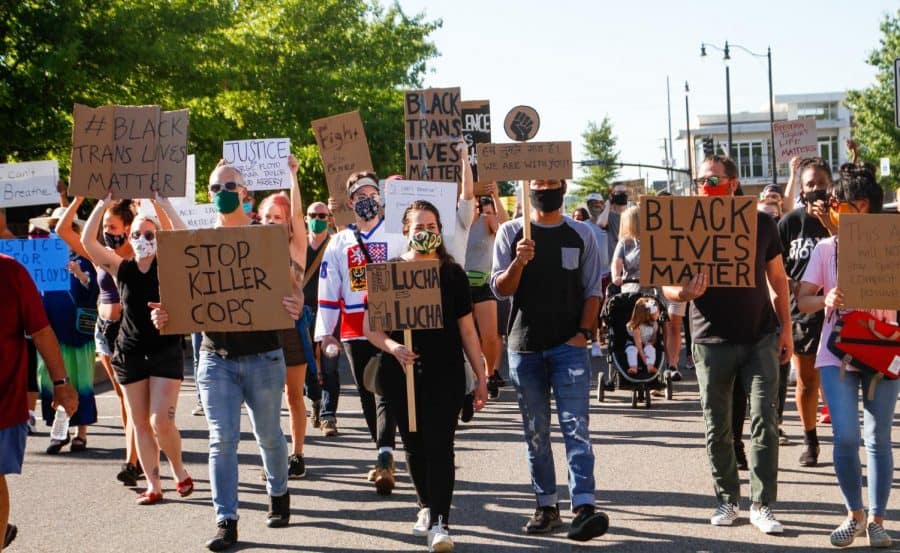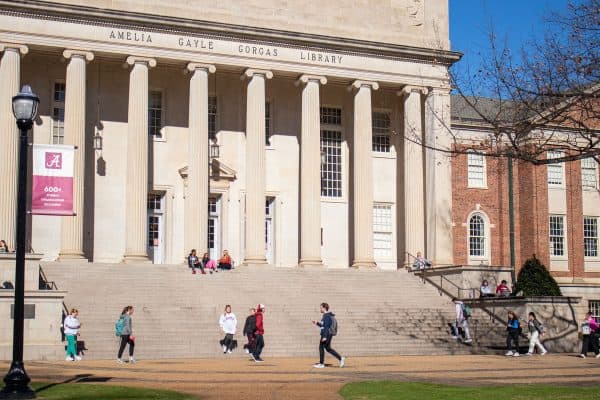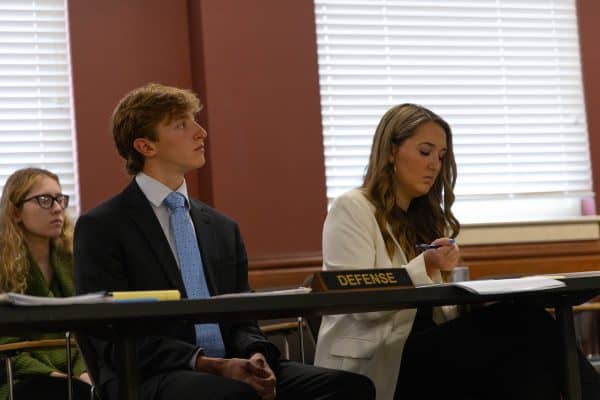Activism and injustice in the Tuscaloosa community
Protestors march in downtown Tuscaloosa in summer 2020.
February 2, 2022
Almost two years after the murder of George Floyd ignited widespread discussion about race and injustice, these discussions have evolved into moves toward change.
Campus
“It [Black Lives Matter] reminded people that we … must always be engaging in advocacy for our issues, that we can’t ever breathe a sigh of relief and think it’s over,” said Cassandra Simon, an associate professor and the vice president of the Black Faculty and Staff Association.
The BLM protests contributed to the Black Faculty and Staff Association’s current activism and advocacy and brought renewed attention to social issues affecting people of color.
BFSA has always been dedicated to creating social change and calling for racial equality at the University while also creating a welcoming space for Black students. Since the summer of 2020, however, the organization has engaged in more activism and advocacy and has seen greater involvement from members of the UA community, including faculty, students and staff.
In November 2021, The University of Alabama dedicated Wade Hall in honor of Archie Wade, the first Black faculty member at the University. BFSA advocated heavily for the rededication of the building, formerly known as Moore Hall, in honor of Wade, a founding member of BFSA.
“We’ve let people know that BFSA is not just about activism and advocacy for just Black people. It is about truly trying to create an equitable kind of environment for everybody,” Simon said.
BLM did not bypass the University, and BFSA responded to the best of its ability, as the COVID-19 pandemic forced the organization to go virtual. Discussions of social issues and programs honoring Black student achievements were relocated to Zoom to protect all members of the community. Recordings of Zoom sessions are still accessible through the BFSA website.
Outside of those events, BFSA meets its goals through programs and events, such as professional development days, the Nyansapo Kente robing ceremony, and a welcome reception for new students in the fall. BFSA hosts speakers and the 2022 Wakanda Scholarship Ball, scheduled for Feb. 5.
“The organization’s goals are to provide an equitable educational experience … for Black Americans at The University of Alabama, as well as help the University understand the needs of its Black faculty, staff and students,” Simon said.
Tuscaloosa
Tuscaloosa Action, a local group with the goal of promoting progressive voices in West Alabama, was created in summer 2020.
Tuscaloosa Action member Emily Altman said they got involved with T-Town Freedom Marchers that summer and marched every week for 30 weeks straight. They marched for BLM and voting rights.
The group asked themselves: “Other than marching, what can we do?”
Despite the initial rush for justice following the death of George Floyd and the protests of 2020, Altman has noticed waning involvement as time continues.
“I think there’s some people who got really involved during that time who are still involved, but I also think that big mass movement has receded a lot,” Altman said. “If you’re marching for something, or emailing for something, or posting about something, and it doesn’t affect you or the people right around you every day, it’s really easy to be like, ‘Well, that was good, we did that,” but not knowing that it’s still here, and it’s still every day, and it’s still like a slog journey to try to get it fixed.
Tuscaloosa Action has been disseminating information and working toward a fair outcome regarding voter redistricting as well. Due to the shift in Tuscaloosa’s demographics, it is now a minority-majority city, though Altman explained that is not how the city is represented in either the district or the city council.
Altman said the statewide redistricting ended up not representing the people of Alabama.
“Tuscaloosa is a minority-majority city now,” Altman said. “It’s 52% Black … and this is the map they’re voting on that’s going to be the map for the next 10 years. And our city council is not a minority-majority city council, and the map that they’re currently proposing does not allow for it to be.”
Though she said Tuscaloosa still needs to be redistricted more fairly, Altman is happy that better statewide voting districts have come to fruition, and she is hopeful for the future of Alabama.
“When I look at the people, again, who are working really, really hard to do good work, I am hopeful because I think more people are doing that than were previously,” Altman said. “I think also, though, that we need more people doing good. … The best solution for fixing bad stuff is more people doing good, right? And so we just need more people doing good, and I think that it’s trending that way but obviously never as fast as you want it to be.”
Altman said activism is not just fighting for what’s right.
“I think one of the things that makes doing activism work and social justice work sustainable, is you find your people in it,” Altman said. “We need more people, but also I think people need to get involved in it because it’s something that sustains people too, right? It becomes a healing space.”
Alabama
Joyce Vance, the former U.S. attorney for the Northern District of Alabama and a current distinguished professor at The University of Alabama’s law school, said she made accountability in law enforcement a priority during her time in office.
“When I was the U.S. Attorney, we aggressively investigated every instance of police misconduct that came to our attention and prosecuted whenever we had the evidence that made it feasible to prosecute, because … that should be one of the prime focuses for law enforcement. There’s really nobody else who can protect us when the people who are supposed to protect us run amok, and so I view that as one of our top priorities,” Vance said.
Vance said corruption in police departments is generally the exception, not the norm.
“I think it’s important to say, though, most police officers honor their oath,” Vance said.
The process of seeking out justice can be frustrating at times, but Vance said the system is designed to protect the innocent against wrongful incarceration.
“We also have to be willing to engage in a due process that’s fair, even to criminal defendants, no matter what they’ve done,” Vance said.
Vance recommended that everyday citizens educate themselves by reading some of the foundational documents that informed our early system, including the Federalist Papers and the Constitution, to form a view that isn’t based in reactionary politics.
“We want to think in a way that transcends politics about justice,” Vance said.
For those pursuing careers in law and politics, Vance said it’s important to remember that the desire for perfection must not stand in the way of working for a better society. This advice is something she remembers her former boss Deputy Attorney General James Cole giving often.
The intersection of activism and mental health often comes up for those who want to work in law or just want to work on social justice platforms like Black Lives Matter. There is such an emphasis on meeting a goal that everything else becomes obsolete, including prioritizing mental health
As the fight for equality pushes on, it is important to remember the toll it takes on Black people and people of color. The work is exhausting, and it is compounded with the fear and anger that come with having a system working against your every move.
Hardships are internalized. The way racial biases must be unlearned and unpacked is the same way racial trauma must be unpacked.
The conversation in and of itself is a product of racism. Who gets to grieve and take time for themselves? The work being done in the name of activism and the people who can afford to take care of their mental health directly intersect with each other. Mental health is often seen as a taboo topic.
In the Black community in particular, there is a stigma around mental health. It is seen as something that needs to be hidden rather than something that millions of people live with every day. That stigma goes hand in hand with the inequity of who gets therapy. The inequity is a byproduct of a broken system that puts Black people at a disadvantage in the same way police brutality does.
The National Alliance on Mental Illness, or NAMI, has separate sections on its website dedicated to explaining how different marginalized communities handle mental health and trauma.
As strides are being made for equality, taking care of mental well-being is key. Asking people how they are, uplifting them and offering help is just as important as being on the front lines for Black people.
This story was published in the Justice Edition. View the complete issue here.
Questions? Email the Culture desk at [email protected].











